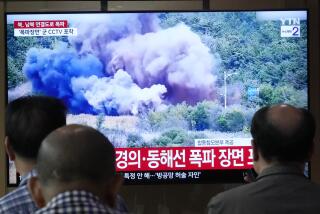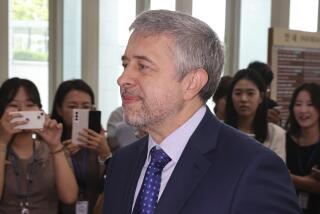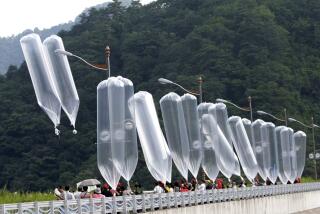Demands by North Bring Shaky Start to Korean Talks
- Share via
PANMUNJOM, Korea — Talks aimed at opening a new channel of dialogue between North and South Korea got off to a dubious beginning Wednesday as delegates from the north pressed their demands that the south abandon plans for annual joint military exercises with the United States.
Hopes had been raised for an improvement in north-south relations after the return from North Korea last week of a prominent South Korean businessman, Chung Ju Yung, founder of the Hyundai conglomerate, who surprised his compatriots by announcing a private accord on limited economic cooperation with the Communist government in the north.
But the impasse in Wednesday’s border talks drove home the harsh realities of confrontation and mutual mistrust between the hostile halves of the peninsula.
Negotiators agreed to resume contact March 2, but only after haranguing each other over the “Team Spirit” war games, which if held as scheduled next month would bring together about 200,000 U.S. and South Korean troops.
“We get the impression that the south is not too sincere about this meeting,” Paek Nam Chun, chief of the North Korean delegation, told reporters after the three-hour session at this truce village in the demilitarized zone.
In a strong signal of its displeasure over the south’s position on “Team Spirit,” North Korea postponed a separate round of talks that were to be reopened Friday at Panmunjom, aimed at arranging a conference of legislators from both Koreas. No progress was made in the first seven sessions of those talks, which began last August when the south was urging North Korea to abandon its boycott of the 1988 Seoul Olympics.
The dispute over “Team Spirit” has stymied the fragile north-south dialogue since South Korea and the United States first conducted the war games in 1976. The north has characterized “Team Spirit” as “provocative” and linked its criticism of it to a demand that U.S. troops be withdrawn from the Korean Peninsula.
Northern Demand
In a widely anticipated move, the delegates from Pyongyang, the North Korean capital, said Wednesday that it would be impossible to convene a proposed meeting of prime ministers and other high officials unless this year’s exercises were canceled.
The South Korean side countered that the exercises are strictly defensive in nature and that they should be discussed, if at all, in the prime ministerial meeting, not in preliminary rounds.
Paek, the chief North Korean delegate, denied allegations by South Korea and the United States that North Korea has held joint naval exercises with the Soviet Union as recently as last December. The two navies have only exchanged “protocol delegations” during independent operations at sea, Paek said, adding that “these are not military exercises.”
The “Team Spirit” exercises were designed as a show of force against a menacing military buildup by North Korea. Recent U.S. intelligence estimates placed North Korean troop strength at more than 1 million, much of it concentrated near the border with the south. The Soviet Union continues to supply Pyongyang with such military hardware as advanced jet fighters and medium-range missiles, according to U.S. and South Korean analysts.
The threat from the north has not abated, despite the recent thaw in superpower relations and South Korea’s successful trade initiatives with Pyongyang’s major allies, hard-liners in Seoul say.
“Military tension is growing on the Korean Peninsula,” said Rhee Sang Woo, director of the Institute for East Asian Studies at Sogang University. “Now is not the time to talk about the withdrawal of U.S. troops or cut back on ‘Team Spirit.’ We need to demonstrate to the Soviet Union and North Korea the U.S. willingness to support the Republic.”
But the exercises and the U.S. military presence have become the subject of controversy in South Korea since democratic reforms allowed more open debate on the issue of Korean reunification.
President Roh Tae Woo has seized the initiative in the popular concern over reunification by proposing a bold program of reconciliation with North Korea. But Roh’s “nordpolitik,” as it is called, has been dismissed by some critics as crafted more for domestic consumption--to bolster the stability of his government--than for genuine rapprochement with Pyongyang.
Improved Ties
The dizzying pace of improved ties with socialist countries has prompted calls for caution. Over the past two weeks, the once staunchly anti-Communist south established diplomatic relations with Hungary, and Hyundai’s Chung returned from his private trade mission with a radical plan to help North Korea build an international tourist resort at Mt. Kumgang, north of the DMZ.
Although the South Korean media at first celebrated Chung’s dramatic plan, it is now settling down to a far more cautious tone.
Indeed, a Pyongyang-based East Bloc journalist, who covered the talks, conceded privately that North Korea’s apparent strategy is to capitalize on growing anti-American sentiment in the south in order to divide opinion over the U.S.-South Korea military alliance.
More to Read
Sign up for Essential California
The most important California stories and recommendations in your inbox every morning.
You may occasionally receive promotional content from the Los Angeles Times.













